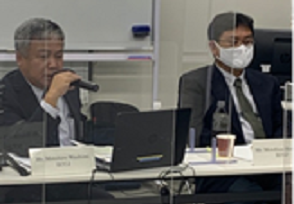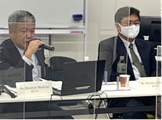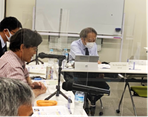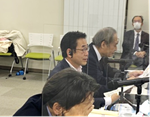
Implementation of energy conservation training (ECAP21 online seminar) for ASEAN countries
<Meeting>
Under the instruction and financial support of the Ministry of Economy, Trade and Industry (METI), the Energy Conservation Center, Japan (ECCJ) conducted training (seminar) by holding a seminar on Thursday, October 8 and Friday, October 9, 2020 with the following objectives.
The training targeted persons in charge of departments related to energy conservation standards for energy management in industry from the governments of the 10 ASEAN nations, together with the ASEAN coordinator, the ASEAN Centre for Energy (ACE). The seminar consisted of lectures given by experts from ECCJ and a private-sector company, together with a panel discussion, and achieved the desired results.
(1) In order to promote energy conservation targeting the industrial world in the 10 ASEAN countries, the importance of setting Energy Management (EM) Manual is recognized and the energy management technical methods are acquired.
(2) In order to promote understanding of advanced energy management, introductions are given to the tools for creating energy conservation implementation plans following the review of the Energy Conservation (EC) Guideline, including the Ene-CAT developed by ECCJ as an energy conservation support tool which combines the approach of an energy management system based on ISO 50001 with energy flow analyzing and visualization methods.
(3) By giving consideration relating to advanced IoT solutions, know-how is acquired for proceeding with energy conservation.
 |  |  |  |
Lecture (by ECCJ) | Lecture |
1. Seminar participants
(1) ASEAN side (44 persons): 37 persons in charge of energy conservation-related measures from the governments of each country, and 7 persons from the ACE.
(2) Japan side (9 persons): 5 persons from the ECCJ International Cooperation Division, 3 persons from the ECCJ Energy Conservation Solution Department and 1 person from an IoT-related private-sector company.
2. Seminar results (Overview)
(1) The participants including government-related persons from each of the countries could recognize the usefulness of the energy conservation support tools in the industrial world. Additionally, the importance of introducing the high-level technologies introduced in activities including this seminar for effectively promoting energy conservation was recognized.
(2) By sharing recognition of the importance of introducing energy conservation support tools relating to energy management and exchanging information relating to subjects such as introduction support systems, it was possible to provide participants with opportunities to investigate each with regard to the introduction of suitable tools in their own countries.
(3) Regarding the formulation of energy conservation implementation plans, the participants could recognize the following points:
The ISO 50001 energy review provides the basic information required for formulating plans.
In the formulation of the actual implementation plans, because it will be necessary to collect various types of data and to formulate the measurement, designation, and improvement methods of the subject equipment and energy losses, the utilization of support tools for this purpose will be important.
(4) Due to the large economic burden placed on private-sector companies, in order to introduce support tools for energy management, the importance of stimulation measures realized through the provision of support (subsidies) by government and the comprehensive introduction of penalties and related systems that will realize stimulation was shared among participants.

